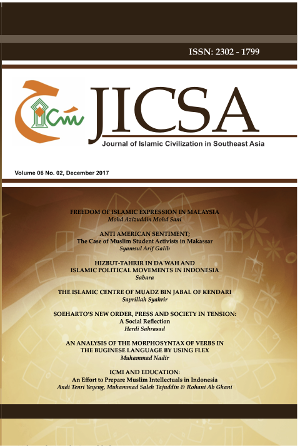HIZBUT-TAHRIR IN DA'WAH AND ISLAMIC POLITICAL MOVEMENTS IN INDONESIA
Abstrak
This paper reviews Hizb ut-Tahrir in the landscape of Islamic da'wah and political movements in Indonesia. The discussion is divided into four sections: Hizbut Tahrir and the trans-national Islamic movements in Indonesia, Hizb ut-Tahrir as a form of Islamic political consciousness, Hizb ut-Tahrir as a da'wah and political movement and its khilafah as a challenge to Negara Kesatuan Republik Indonesia (NKRI-the Unitary State of the Republic of Indonesia) concept. As a trans-national movement, Hizbut-Tahrir spread through three major aspects i.e. social movements, education and da'wah, as well as through publications and the internet. Hizbut Tahrir in Indonesia then becomes a mass organization with its official name Hizbut Tahrir Indonesia (HTI). HT is a model of Islamic political awareness based on the blueprint of the past government model of khilafah ala minhajun nubuwwah. The awareness of political Islam is strongly based on a response to the condition of Muslims and Islamic countries experiencing a downturn and under the control of Western dominations and hegemonies after the colonialism era. Based on this, the presence of HTI in Indonesia cannot be separated from movements carrying the mission of siyasah (politic) to achieve the HTI’s goal of Khilafah Islamiyah. In order to realize the goal, the HT movements choose parliamentary paths through door to door dakwah in the form of halaqah. Khilafah and NKRI (Pancasila) are two diametrically different concepts. HTI Movements in Indonesia of course will receive a resistance, even be considered as "a latent danger" that threaten the existence of NKRI and Pancasila. The idea of enforcing Khalifah Islamiyah as a political struggle will certainly challenge the existence of NKRI and Pancasila as the ideology of the Republic of Indonesia. The concept of Khilafah Islamiyah is essentially 180 degrees different to the concept of NKRI and Pancasila.Referensi
Esposito, John L. Ancaman Islam: Mitos atau Realitas, Bandung: Mizan, 1996.
_____________, Islam and Politik. Jakarta: PT. Bulan Bintang: 1990.
Greg, Fealy and Anthony Bubalo. Jejak Kafilah: Pengaruh Radikalisme di Indonesia.Bandung: Mizan. 2007.
Hasan, Noerhaidi. “Jalan Lain Menuju Demokrasi”, A Preface to Ainur Rofiq al Amin, Membongkar Proyek Khilafah ala Hizbut tahrir di Indonesia, Yogyakarta: LKiS. 2012.
Rahmat, Imdadun. Arus Baru Islam Radikal: Transmisi Revivalisme Islam Timur Tengah ke Indonesia. Jakarta: Erlangga. 2002.
Roy, Oliver. Globalized Islam the Search for a New Ummah. London: Hurst, 2004.
Ridwan, Nur Khaliq. Regenerasi NII: Membedah islam Jihadi di Indonesia, Jakarta: Erlangga, 2008.
Samarah, Ihsan. Biografi Singkat Taqiyuddin al-Nabhani. Bogor: al-Izzah Press. 2002.
Tim Peneliti Bidang kehidupan Keagamaan Balai Penelitian dan Pengembangan Agama Makassar, Pergeseran Paham Keagamaan mahasiswa Muslim di Kawasan Timur Indonesia. Makassar, Balai Litbang Agama Makassar. 2015. A research report.
Wahid, Abdurrahman. (Ed), Ilusi Negara Islam: Ekspansi Gerakan Islam Transnasional di Indonesia. Jakarta: Gerakan Bhineka Tunggal Ika-the Wahid Institute-the Maarif Institute, 2009.





.png)









